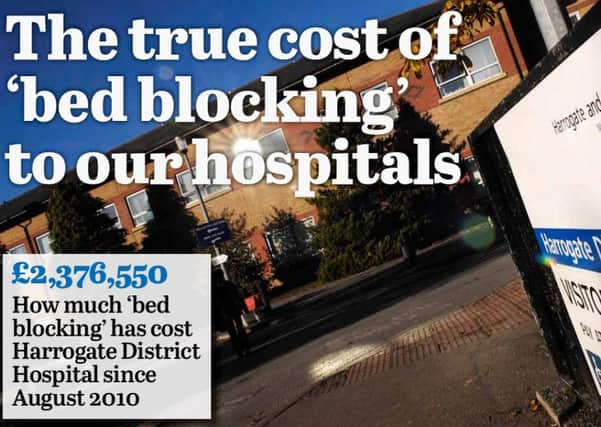‘Bed blocking’ costs Harrogate Hospital £2 million


The number of days lost to so-called ‘bed blocking’ has been steadily increasing with a sharp increase in the number of patients waiting for a care home place, or care at home packages before they can leave the hospital.
Age UK has blamed an ‘escalating social care crisis’ for the issue and said that being unable to leave hospital can be detrimental to people’s health.
Growing Problem


Advertisement
Hide AdAdvertisement
Hide AdFigures compiled by the Harrogate Advertiser show that in the last year the number of patients delayed from leaving hospital due to not having a nursing home or care home place available has increased by more than 200 per cent from 65 days from April 2013 to March 2014 to 224 from April 2014 to March 2015.
From April 2014 to March 2015 Harrogate and District Foundation Trust had 2,460 ‘delayed days’, a day in which a hospital bed has been filled by a patient who could have been sent home. Based on the average NHS bed costing £1925 per week this means that bed blocking cost the Trust around £676,500 last year, up from £517,825 the previous year.
Not only local patients
North Yorkshire County Council’s Director of Health and Adult Services Richard Webb said that not every patient at Harrogate Hospital was from the area and therefore not all of the patients needing social care arrangements fell under the county council’s responsibility.
Mr Webb said: “There are increasing numbers of patients from North Leeds or from Bradford or elsewhere out of the county council’s area.
Advertisement
Hide AdAdvertisement
Hide Ad“We don’t want people to be in hospital if we can at all help it, we want to get them home.”
Over 1,000 of the 2,460 delayed days in 2014/2015, were lost due to patients or their families exercising choice. The NHS guidelines say this includes people who have been made a reasonable offer of services, but who have refused that offer for example by insisting on placement in a home with no foreseeable vacancies.
Mr Webb said: “These are people taking a bit of time to decide where they are going to live and the care they will take, these are big decisions, life changing decisions.”
Shortage of places and staff
Harrogate’s care industry is straining under the pressure of increased demand, experts say, with fewer places available in care homes.
Advertisement
Hide AdAdvertisement
Hide AdTwo Harrogate care homes closed their doors last year, including Alexander Court which was shut down following poor inspection reports.
Mr Webb said: “In taking difficult decisions we have had to make about the quality of the care that has meant fewer nursing beds available. We are working with care providers and care homes across the area.”
He added: “We are working with nursing home and other care providers on how to improve the situation and how we can recruit more staff and more nurses, there is a national shortage of nurses.”
Keren Wilson, chief executive of the Independent Care Group (ICG), which represents care providers in North Yorkshire said the number of care homes which have closed in recent years had exasperated the problem. According to the ICG’s figures at least five care homes in Harrogate have closed in the last five years, and she believes the national recruitment crisis has had a greater impact in North Yorkshire than other parts of the UK.
Advertisement
Hide AdAdvertisement
Hide AdShe said: “Yes recruitment is a national issue, but in Harrogate it is worse, especially for home care workers. The level of unemployment is so low in the area it makes it difficult to recruit.”
Funding
Age UK has said the increasing delays as patients wait for care are happening against the backdrop of £2.4 billion (31.2%) cuts from social care budgets across the UK for older people since 2010.
Mr Webb said although the council has had to make savings it has kept adult social care as a clear priority and North Yorkshire’s health and social care budget has reduced by 11 per cent, compared to a national average of 30 per cent.
The County Council said it is also using its public health grant to invest in prevention services and extra care schemes. He said: “There are still more people than ever before using the hospital services, families aren’t always around or living nearby to provide care as they may have been 20 or more years ago.”
Advertisement
Hide AdAdvertisement
Hide AdAs part of his role as honorary secretary for the association of directors of adult social services Mr Webb has said that if the government wants to protect the NHS it is important to protect social care as well. An average NHS hospital bed costs £1925 a week compared to about £558 for a week in residential care or £357 for home care, meaning huge sums of tax payers money could be saved if patients were able to move on.
Ms Wilson said: “The hospital beds they are very expensive but there isn’t anywhere else for them to go.”
North Yorkshire County Council has been forced to make budget savings of £92 million in recent years, and face a further £73 million of budget cuts over the next four years.
Despite this Mr Webb insisted that adult social care has remained a ‘top priority’ for the council and that public health funding had been invested in social care.
New models of care
Advertisement
Hide AdAdvertisement
Hide AdEarlier in the year Harrogate was chosen as one of 29 ‘vanguard’ sites in England to trial a new look NHS healthcare provision which will include more health care at home and greater links between health and social care.
Virtual hubs will be set offer advice on self care 24/7 and three to four community hubs will be set up across the region with GPs, specialist nurses and staff from mental health and adult social care teams.
Mr Webb said: “We want to work with the new models of care and work really closely with care providors to reduce the need for people to go to hopsital in the first place, then look at better discharging to get them home at the right time of them.”
Mr Webb also called for a return to traditional convalescent style care, allowing patients to recover and have time to make decisions on future care without putting pressure on the hospital.
Advertisement
Hide AdAdvertisement
Hide AdMs Wilson agreed that specialist recuperative care would be a good option for the district.
She said: “You need it with older people, making sure they are getting three square meals a day when they come out of hospital, especially if they live by themselves.”
Harrogate and District Foundation Trust were contacted by the Advertiser regarding the figures and invited to give a response, however it decided that North Yorkshire County Council’s representative would speak on its behalf.